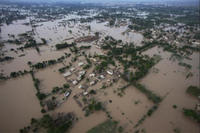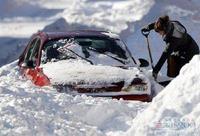-
Before the deluge: improving flood forecasting

Summer 2012 was the third consecutive summer in which Pakistan has endured catastrophic floods; thirty million people were affected in 2010 and 2011; the summer 2012 floods affected 4.7 million more, killed nearly 500 people, and led to the evacuation of 350,000; Pakistan, stubbornly refusing to accept external assistance in flood forecasting, is not able to predict and prepare for natural disasters on its own
-
-
Appearances deceive: supposedly “stable” zone make earthquakes even more powerful
In an earthquake, ground motion is the result of waves emitted when the two sides of a fault move — or slip — rapidly past each other, with an average relative speed of about three feet per second. Not all fault segments move so quickly, however; new earthquake fault models show that “stable” zones may contribute to the generation of massive earthquakes
-
-
Sen. David Vitter (R-La.) calls Sen. Harry Reid an "idiot” over Katrina comment

Last week, during a floor debate in the Senate on the $9.7 billion portion of the Sandy relief measure, Majority Leader Harry Reid (D-Nevada), who supported the measure, said: “The people of New Orleans and that area, they were hurt, but nothing in comparison to what happened to the people in New York and New Jersey”; in response, Sen. David Vitter (R-Louisiana) said: “Sadly, Harry Reid has again revealed himself to be an idiot”
-
-
"Prophylactic dressing" for walls make buildings safer during earthquakes
In the case of earthquakes, only seconds may remain for a safe escape from buildings; debris falling down and obstructing the escape routes may even aggravate the situation; a new product extends the time for saving lives by reinforcing walls and keeping off the debris; an innovative building material manufacturer now has launched the mature innovation in the market
-
-
Congress approves first part of Sandy relief measure
Congress approved a $9.7 billion Sandy aid package last Friday after a two month delay; the delay was caused by fiscal cliff talks, warnings of federal funds cutbacks, and controversy over millions of dollars in unrelated projects; in two weeks, Congress will vote on the second part — an additional $50 billion Sandy relief package
-
-
BP settlement includes $350 million funding for Gulf health, environmental protection

As part of the $4 billion settlement announced last month between the federal government and BP concerning the 2010 Deepwater Horizon disaster, the National Academy of Sciences has been asked to establish a new $350 million, 30-year program on human health and environmental protection in the Gulf of Mexico
-
-
Facing bipartisan outrage, House leadership abandons plan to postpone Sandy relief vote
Responding to bipartisan outrage expressed by the New York and New Jersey congressional delegations, House Speaker John Boehner said he was committed to hold a House vote by 15 January on a large relief package for victims of Superstorm Sandy; in addition to abandoning the plan to postpone the vote, the House leadership also gave up on bringing to a vote the $27 billion relief measure proposed by the House Appropriations Committee, and instead will bring to a vote the White House-proposed and Senate-approved bill, which calls for $60.4 billion in disaster relief
-
-
The natural relationship between CO2 concentrations and sea level means that sea level will continue to rise
By comparing reconstructions of atmospheric CO2 concentrations and sea level over the past forty million years, researchers have found that greenhouse gas concentrations similar to the present (almost 400 parts per million) were systematically associated with sea levels at least nine meters above current levels
-
-
Study warns of more powerful quakes in the Himalayas
A research team has discovered that massive earthquakes in the range of 8 to 8.5 magnitudes on the Richter scale have left clear ground scars in the central Himalayas;this discovery has important implications for the area along the front of the Himalayan Mountains, given that the region has a population density similar to that of New York City
-
-
Winter storm hits Midwest, heading toward Northeast

A powerful winter storm system hit the U.S. Midwest Wednesday, heading toward the states of the Northeast, where high winds and heavy snow have disrupted holiday travel, left tens of thousands without power, and were blamed in at least six deaths
-
-
Fiscal cliff discussions get in way of post-Sandy relief measure
The post-Sandy rebuilding effort in the northeast has been stalled by the debate going on in Congress about a solution to the national debt
-
-
Potentially devastating asteroid collision in 2040 not likely to happen
A team of astronomers from the University of Hawaii’s Institute for Astronomy (IfA) have confirmed that the chance of asteroid 2011 AG5 impacting Earth in 2040 is no longer a significant risk — prompting a collective sigh-of-relief; previously, scientists estimated that the risk of this 140-meter-diameter (about the length of two American football fields) asteroid colliding with the Earth – and releasing about 100 megatons of energy — was as high as one in 500
-
-
Sandy relief bill says rebuilding effort should take into consideration climate-related risks
The $60 billion Sandy relief bill being debated this week in the Senate does not specifically mention the words climate change or global warming, but it implicitly raises topics and themes which are part of the climate change discussion; the bill says that federal, state, and local agencies engaged in the post-Sandy rebuilding effort should take into consideration “future extreme weather events, sea level rise and coastal flooding”
-
-
A 1978 NY state law requiring updated emergency preparedness plans largely ignored
In 1978, a New York state law was passed which required that annually updated plans for the restoration of vital services in the event of a major storm; in the three decades since, the law has been largely ignored due to tight budgets and politicians unwilling to prepare for a storm which may or may not hit
-
-
Haiti's food situation looks bleak in Sandy’s aftermath
The aftermath of Hurricane Sandy, which ripped through southern Haiti in October, will extend beyond destruction and injury; the current and future food security looks bleak barring significant intervention during the next year
-
More headlines
The long view
Using Drone Swarms to Fight Forest Fires
Forest fires are becoming increasingly catastrophic across the world, accelerated by climate change. Researchers are using multiple swarms of drones to tackle natural disasters like forest fires.
How Climate Change Will Affect Conflict and U.S. Military Operations
By Doug Irving
“People talk about climate change as a threat multiplier,” said Karen Sudkamp, an associate director of the Infrastructure, Immigration, and Security Operations Program within the RAND Homeland Security Research Division. “But at what point do we need to start talking about the threat multiplier actually becoming a significant threat all its own?”
